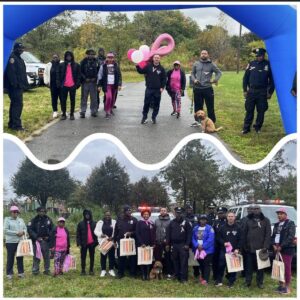On Saturday, October 21st, the 69th Precinct held its 3rd annual Breast Cancer and Domestic Violence walk in Canarsie Park. October is Awareness Month for both, and members of the community, along with NYPD youth Explorers, auxiliary officers and elected officials, walked in support of survivors, those who lost their lives or are still battling breast cancer and domestic violence.
The NYPD, Department of Community Affairs and the 69th Precinct Community Council led the assembly to share stories, support and honor those who are battling breast cancer or dealing with domestic violence.
Although there is no direct correlation between breast cancer and domestic violence, it did share a commonality at the event – togetherness. Community Affairs Officer Nicole Rostant told the Canarsie Courier, “Unfortunately, not everyone knows how to deal with illness, and some hurt unintentionally; it can be your friends or family.” It’s okay that we may not understand the mental state of someone going through an illness. It is, however, essential to consider the vulnerability of your sick friend or relative.
Domestic violence has risen since the pandemic from 25% to 33% percent globally, and a little over 8% in the United States, according to The Harvard Gazette in 2022. Domestic violence is aggressive behavior within the home involving spouse or partner abuse. While some community members walked for domestic violence, others walked for breast cancer awareness, such as the significance of getting mammograms.
According to the National Breast Cancer Foundation, Inc., on average, 40 million mammogram screenings are conducted annually in the U.S. A mammogram, or mammography, is an X-ray photo of the breast that can detect abnormalities up to three years before a person discovers it. Depending on your age and medical history, your doctor can advise the frequency of your mammogram screening, typically once a year.
Did You Know?
Brooklyn-born actress Edie Falco, who played Carmela Soprano on the HBO hit series, The Sopranos, found out she had breast cancer when she was just 40. Breast cancer is not only found in women. Although male breast cancer is rare, one in 1,000 men will be diagnosed with the disease.
One thing you can do to help with both breast cancer and domestic violence is to talk about it with your family, friends and community. To learn more about breast cancer, visit nationalbreastcancer.org. To get help with domestic violence, call 800-799-7233 or text START 88788.


